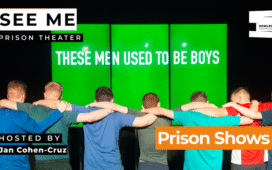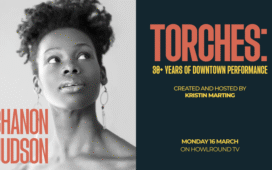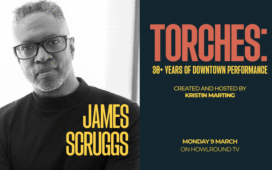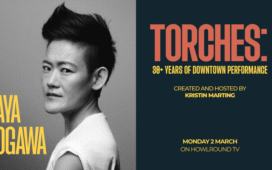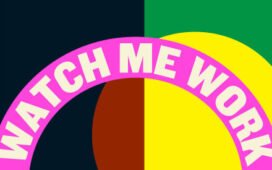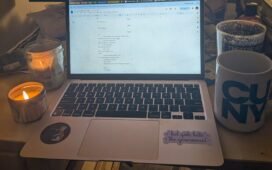While Pitbull’s concert is the setting, the play focuses on these two Cuban Jewish families—one escaping the hurricane, another who caused it. Pitbull’s concert is being supported and endorsed by members of Corporate Miami, who are deeply invested in the Israeli state. I take direct inspiration from developers and business owners in the Miami Jewish community who profit from development in Miami and who fund the Israeli settler project, like those who have funded over $5 million in settlements in the West Bank and members of the Greater Miami Jewish Federation’s real estate division that make no mention of climate change but assert an everlasting faith in the Israeli state. The portrayal of these characters aims to call out both the American Jewish community’s complicity in the genocide of the Palestinian people (through their financial support of the Israeli government) and their disinvestment in protecting Miami from climate change.
At the center of the other Jewish and Cuban (Jewban) family are two lesbians: Tamar, who is Jewish and from Israel, and Mari, who is Cuban and from Miami. Tamar’s brother is employed by Corporate Miami, and Mari’s abuela is an old friend of Pitbull. I take inspiration from Naomi Klein’s The Shock Doctrine: The Rise of Disaster Capitalism where she says, “The recent spate of disasters has translated into such spectacular profits that many people around the world have come to the same conclusion: the rich and powerful must be deliberately causing the catastrophes so that they can exploit them.” In Pitbull’s Party at the End, Corporate Miami causes the hurricane by participating in such a vicious type of capitalism that takes advantage of disaster and turns it into a commercial event.
As the characters escape from a sinking, flooding, doomsday Miami, they contend with what it means to leave home and become a climate and political refugee, somewhat clumsily but quite honestly. Tamar and Nathan (a member of Corporate Miami) understand that Miami has no future. Others, like Abuela and Jacob (the ringleader of Corporate Miami), deny the city’s downfall. Mari openheartedly acknowledges that the hurricane is causing the demise of her home–Hortense has displaced her.
Climate Emergency in Miami
The action of the play mimics a dynamic in modern-day Miami in which the city government believes they can save the city without restricting corporations. Since this summer, flooding has plagued South Florida due to heavy rainfall in hurricane season. South Florida is at extreme climate risk due to its location and its geography. Just a couple of weeks after Hurricane Helene hit the southeastern United States, Milton came barreling in, causing damage. Cars maneuvered the streets like boats. King tides, very high tides that are unrelated to rain, are getting even worse with climate change. This hurricane season has already claimed three hundred lives.
Besides its location and geography, what makes Miami especially vulnerable to the climate crisis is the unchecked capitalist development that plagues the area. To developers, architecture corporations like Arquitectonica, and the city and state government, change means rebuilding, often “bigger” and “better,” and moving on, instead of engaging in any social or political reckoning. An example is the Surfside Towers collapse of 2021, where ninety-eight people died in a condominium collapse on Miami Beach. The plot was not turned into a memorial or park, but was instead purchased by Hussain Sajwani of DAMAC Properties, an Emirati billionaire who is friends with Donald Trump, to develop a luxury condominium. In my view, the expansion of Miami has destroyed the city’s chances at a future. The city government recently commissioned the Buoyant City (2020) report that lays out how to save Miami’s historic districts from catastrophic flooding, meaning they think the city has a chance to stop it. Meanwhile, scientific reports like the Union of Concerned Scientists’ 2016 report on rising sea levels in Miami propagate the belief that Miami’s current capatalist and materialistic approach to development offers a solution.
I yearn for theatre that is rooted deeply in Jewish tradition and belief but that rejects wholeheartedly the community’s investment (political, emotional, and financial) in Israel and Zionism.
Toward an Anti-Zionist Jewish Theatre
The climate crisis in Miami and the ongoing genocide in Palestine are inextricably linked, as many in the Miami Jewish community seem to ignore its climate crisis and instead support (financially and politically) the expansion the Israeli state through its occupation of Palestine, evidenced by the lack of climate goals in major Miami Jewish organizations and the abundance of pro-Israel rhetoric in the same spaces. Corporate Miami, as I call them in Pitbull’s Party at the End, are members of my American Jewish community and share many values with those in the broader community, which is why I chose to make them part of my play.
My parents raised me Recontructionist, a type of Judaism that rejects traditions that no longer serves the community and embraces new language and practice to be of the modern world. I went to Torah school growing up and was involved with my school’s Jewish group. I had been questioning Israel’s occupation of Palestine for a while, but it wasn’t until after 7 October, 2023 that I began to take a firm anti-Zionist stance. I understand Zionism as the belief that the land between the Jordan River to the Red Sea should be a Jewish state, now known as Israel, including the Occupied Palestinian Territories. I am anti-Zionist because I am Jewish, and my Jewish values teach me that everyone should have access to justice (Tzedek, Tzedek Tirdof) and to heal the world (Tikkun Olam). What is happening right now in Palestine is horrifying and an unforgivable transgression on behalf of the whole Jewish community.
I yearn for theatre that is rooted deeply in Jewish tradition and belief but that rejects wholeheartedly the community’s investment (political, emotional, and financial) in Israel and Zionism. I wrote this play not only to critique Zionism, but also to illuminate the fractures it is creating in the Jewish community and the threat that it poses to our continued existence. In the play, Abuela reveals that she grew up Jewish but that after witnessing the acts of the Israeli government toward Palestinians she could no longer identify with the community. When Mari learns that she is Jewish, she rejects the identity; like Abuela, she has conflated Judaism and Zionism. Tamar, her granddaughter’s girlfriend, tries to illuminate why Judaism isn’t Zionism. This is a warning call to raise awareness about legislation like the recent House Resolution 894 that also conflates the two.
Pitbull’s Party at the End is a definitionally anti-Zionist play. Creating anti-Zionist theatre means writing Jewish performances that question a connection to Israel, that critique a connection to Israel, and that allow a Judaism outside of Israel to flourish. It allows us as Jews to oppose the members of our community who support Zionism, to connect, and to share our beliefs. The first play I ever saw that questioned Zionism was David Rosenberg’s play Effect If Not Intent, in which one brother joins the Israel Defense Forces (IDF) and the other adopts a pro-Palestine perspective. This rips the brothers apart. As Jewish Americans, we need to see Jews asking what it means to be Jewish when Judaism is conflated with a genocidal ideology so that we can find the strength (out of dire necessity) to do it ourselves. However, Jewish anti-Zionist voices should not be the center of the movement; we must listen to the Palestinian people who tell us their experiences and beliefs. At the same time, Jewish anti-Zionist theatre allows us to cultivate our community of resistance to the American Jewish pro-Israel perspective.
Mangroves can allow us to imagine an alternative method of hope for Miami—one that rejects wealth and property accumulation as safety and security but instead embraces community with ecology and survival of us all.
Mangroves as Metaphor
Written into the script of Pitbull’s Party at the End are mangroves, tropical bushes that line the coast, that encroach more and more until they occupy the stage. These mangroves offer a solution to Miami’s crisis. Mangroves are an endangered and keystone species with great metaphoric potential as a rhizome, meaning a plant stem that grows horizontally and subterraneously. You can break off any part of a rhizome, plant it somewhere else, and it will continue to grow. In Alejandra T. Vazquez’s piece Learning to Live in Miami, she writes:
I turn to mangroves because they propose a unique and vivifying pause if you find yourself brought to the edges – material, national, affective, toxic–of Miami…A rousing impression of intense rootedness, of a transition toward an abyss and a tidal undertowing to a new place, all at once…The question mangroves might answer: no matter what is done to us and them, we and they still grow up and out into mineral-rich, mangled structures that carry the smells and sounds of antiquity and futurity.
This illuminates the way mangroves can allow us to imagine an alternative method of hope for Miami—one that rejects wealth and property accumulation as safety and security but instead embraces community with ecology and survival of us all. A method that centers the ecological world and asserts a future for Miami that promotes equity and justice for all beings of the area. Mangroves keep us grounded; they connect us.


